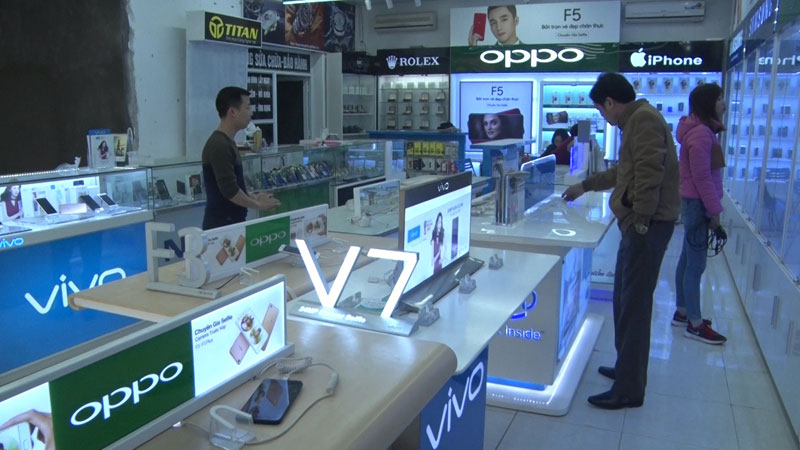
(HBO) – The Party organisation of Bo town in Kim Boi district has made Party building a key task. Its efforts to improve the Party’s leadership and capacity of Party members have paid off, earning the recognition as a strong and transparent Party organisation for many consecutive years.
Bo town’s Party organisation has 224 members, divided into 12 Party
cells. The town’s Party Committee and its standing board always pay attention
to political and ideological education for Party members. Under the direction
of the town’s Party Committee, officials and people of Bo town have actively
engaged in emulation campaigns in production and business activities. Many
Party members have become role models in poverty reduction. One of them is Bui
Mong Huyen in Tan Thanh, who trades in motorcycles and electronic goods,
earning 500 million VND in profit on an annual basis. Another example is Vu
Hung Dung, whose mobile phone business generates a yearly profit of 300 million
VND and creates jobs for 10 labourers.
Thanks to the Party Committee’s leadership in economic development,
local living standards are on the rise. In 2017, per capita income reached over
26 million VND and the rate of poor households reduced to 2.9 percent. All
children have been sent to school, while the rate of malnutrition among
children is decreasing.

The
business of Vu Hung Dung and his family generates a yearly profit of 300
million VND.
Nguyen Quang Truong, Secretary of Bo town’s Party Committee said in
instructing the implementation of political tasks, the Party Committee and local
authorities always prioritise both economic development and Party building.
Party building must cover all three main aspects of politics, ideology and
organisation, in combination with expanding Party membership.
The committee assigns its members to work with subordinate Party
cells, helping the cells and members uphold the leading role in everyday tasks.
In order to improve political and leadership capacity among Party members,
Bo town’s Party Committee has been committed to imparting instructions and
resolutions of the Party at all levels, particularly the Politburo’s Directive
No. 05 on following the late President Ho Chi Minh's thinking and ethics and
style; and the 11th and 12th Party Central Committees’ resolutions
on Party building.
As such, in 2017, 100 percent of Party cells in Bo town were
recognised as transparent and strong Party organisations, and 99 percent of
Party members recognised as fulfilling their tasks./.
In the spirit of "Party members go first, the people follow”, all households of Party members in the Doan Ket sub-region in Da Bac town, Da Bac district, voluntarily removed gates and fences, and donated land when the road expansion project passed through their properties. Inspired by their example, 68 households in the sub-region quickly followed suit, contributing over 1,400 sq.m of residential and perennial cropland to widen the main road through the residential area. The exemplary role of Party members in Doan Ket stands as a shining example of studying and following President Ho Chi Minh’s thought, morality, and lifestyle.
The Hoa Binh provincial People's Committee held a monthly meeting on May 29 to assess the implementation of socio-economic development tasks in the first six months of 2025, the progress of key projects, and some other important issues.
During his lifetime, President Ho Chi Minh always expressed his deep affection and special concern for children and youth. He once emphasized: "Caring for and educating children well is the responsibility of the entire Party and the entire people”; "First of all, the family (i.e. grandparents, parents, siblings) must do this job well”. "the Party Committees…, the Children’s Committee, the Youth Union, the education sector, and all related organizations must have specific plans to ensure children grow healthier and more progressive”. His teachings has been remaining valuable and serving as the guiding principles in the work of protecting, caring for, and educating children. In line with this ideology, Hoa Binh Province has continuously been prioritizing and investing resources in the well-being of children in recent years.
Mr. Nguyen Phi Long, the alternate Member of the Party Central Committee and Secretary of the Provincial Party Committee chaired the meeting of the Standing Committee of the Provincial Party Committee to provide opinions on several investment projects within the province. There was the attendance of Ms. Bui Thi Minh, the Permanent Deputy Secretary of the Provincial Party Committee and Chairwoman of the Provincial People’s Council; Mr. Bui Đuc Hinh, the Deputy Secretary of the Provincial Party Committee and Chairman of the Provincial People’s Committee and other members of the Standing Committee; the leaders from other departments, agencies, and some localities.
The Standing Board of the Vietnam Fatherland Front (VFF) Committee of Hoa Binh province held a meeting on May 28 to honour outstanding village elders, village heads, and reputable individuals from local ethnic minority and religious communities.
In mid-May, the provincial Museum organised an exhibition named "Duoi la co Dang Cong san Viet Nam quang vinh” (Under the flag of the glorious Communist Party of Vietnam). This meaningful activity took place in the joyful atmosphere to celebrate the country's major holidays and the Party congresses at all levels for the 2025-2030 term, towards the 14th National Party Congress.



